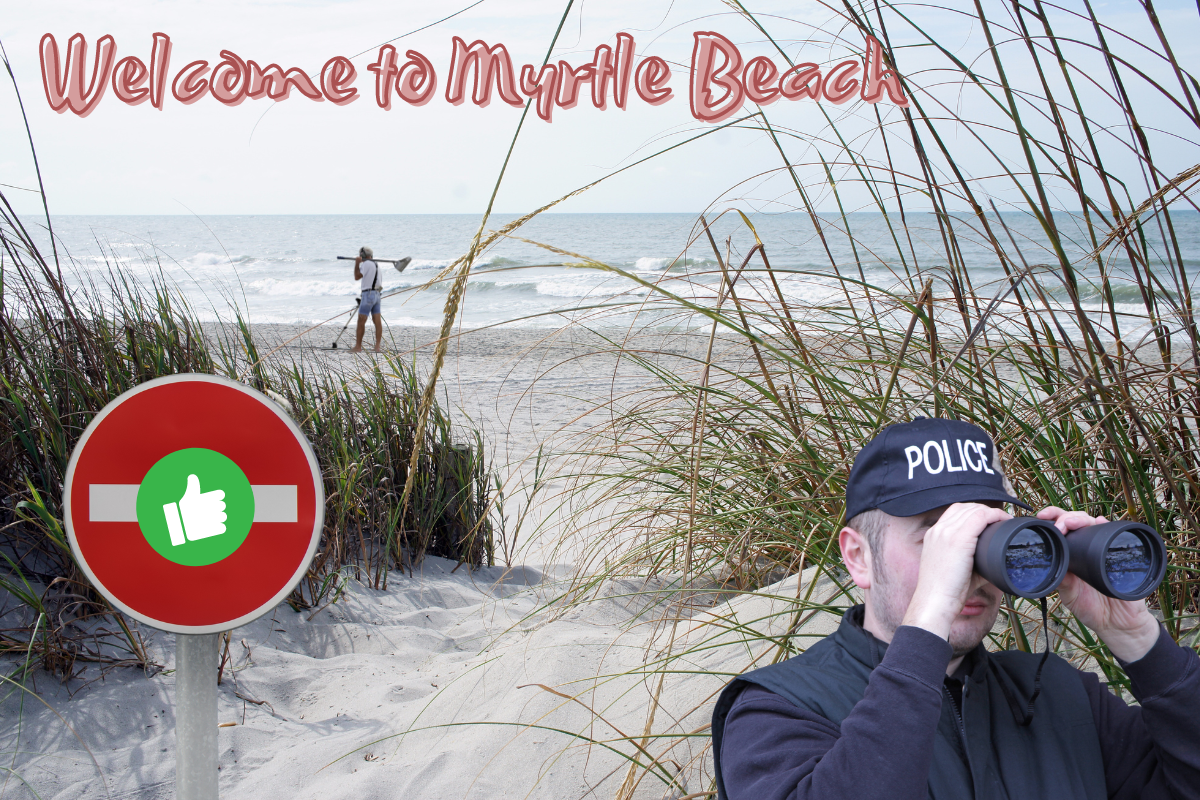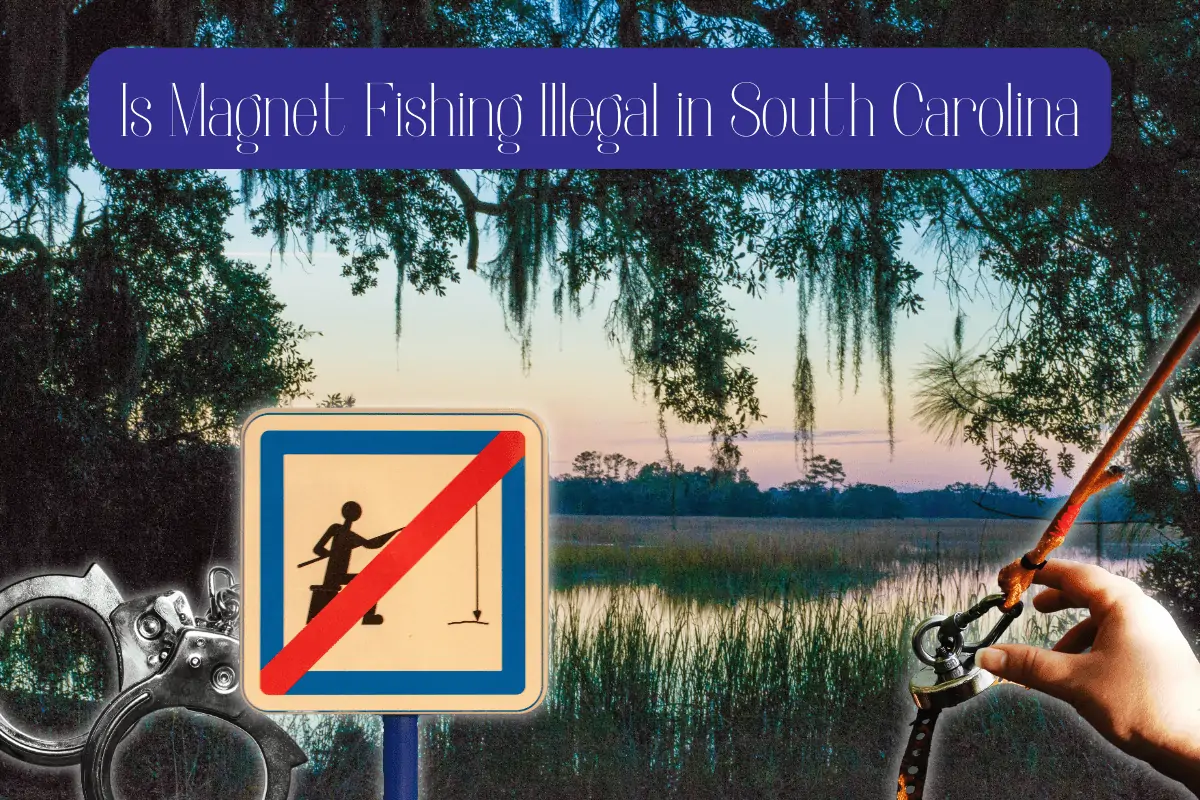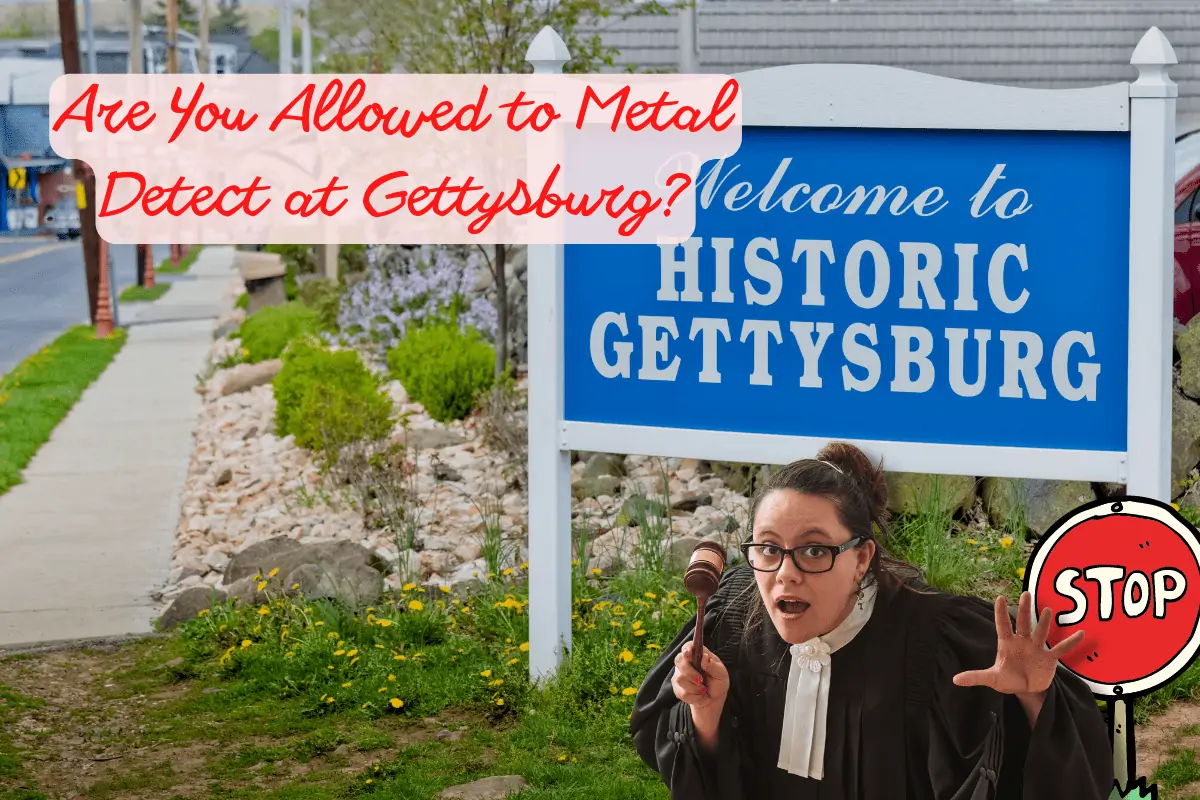Metal detecting in cemeteries is a popular topic, as many people want to know if they need permission to metal detect on these hallowed grounds. The answer to that question, and others like it, are answered in this blog post.
We’ll discuss metal detecting rules and ethics, as well as what sorts of treasures you might find in cemeteries and other history-rich locations. Stay tuned for more information about metal detecting in some really interesting places!
Can You Metal Detect in Cemeteries?

Cemeteries are a popular metal detecting destination for many reasons. For one, they tend to be located in historically rich areas, which means there is potential to find all sorts of interesting artifacts.
Secondly, metal detectors can be extremely useful in locating so many different kinds of valuables that may have been lost over time. Finally, metal detecting in cemeteries can be a very respectful way to locate the final resting place of our loved ones.
With all that said, can you metal detect in cemeteries?
Yes, you absolutely can metal detect in cemeteries. While there are some exceptions and caveats, if you’re itching to search for lost treasures in a cemetery, there’s no reason why you can’t.
While there is no clear federal law stating that you cannot metal detect in a cemetery, as with any privately owned property, you must obtain permission from the owner before you begin metal detecting.
And make sure you’re being careful along the edge of the property. I doubt you’ll see any property stakes letting you know you’ve crossed over onto a separate plot.

This is where things can get a bit tricky, as cemeteries are often owned by municipalities, religious organizations, or even private individuals.
If you’re planning on metal detecting in a cemetery, your best bet is to start by contacting the cemetery’s owner and asking for permission.
The best way to identify who the owner of the land is is by looking up the cemetery’s deed through records kept at county offices. These records will contain property lines and other important information that will tell you who owns the cemetery.
Some other alternatives would be to reach out to some local funeral homes or even the cemetery sexton.
Sextons are the people responsible for the maintenance and upkeep of cemeteries. They would likely have a good idea of who owns the cemetery and how to get in touch with them.
What Can I Find Metal Detecting in a Cemetery?
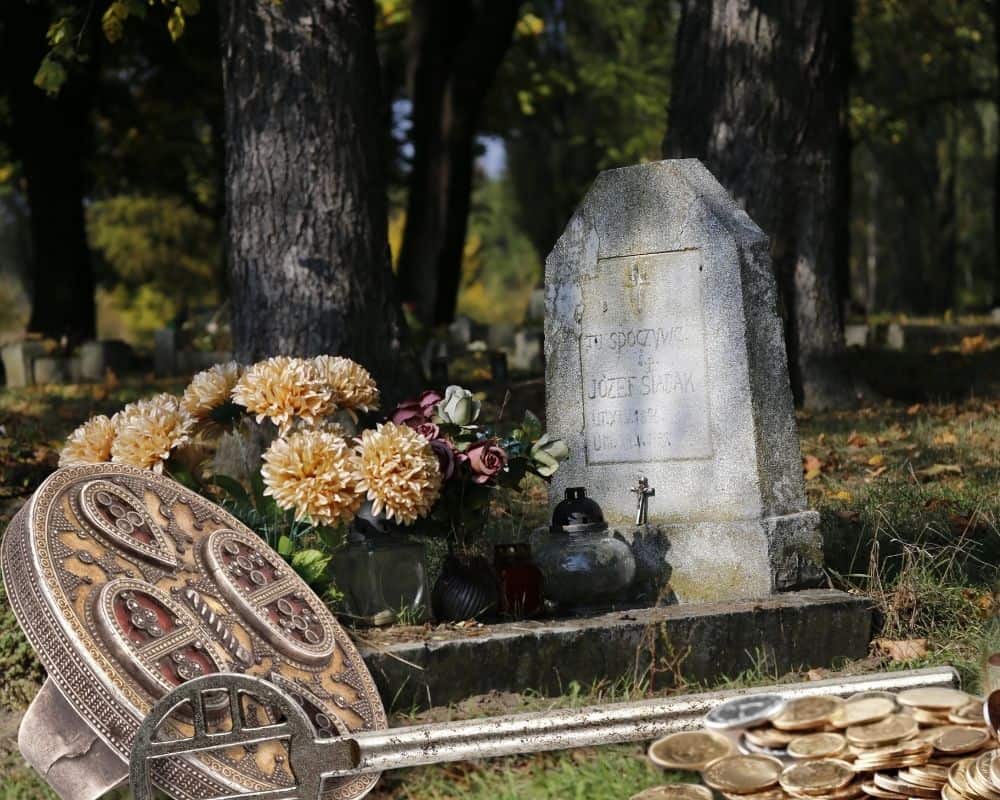
Now that we’ve answered the question of whether or not you can metal detect in a cemetery, let’s talk about what sorts of treasures you might find.
As cemeteries are often located in historically rich areas, there is potential to find all sorts of interesting artifacts.
Some common items that are found when metal detecting in cemeteries include old coins, jewelry, buttons, and other metal objects. Most detectorists hope to find some sort of relic or piece of history when metal detecting and cemeteries are often a good place to start.
Can You Metal Detect Churches?
Yes, you can metal detect churches. Just remember, like any cemetery, you need permission to do so.
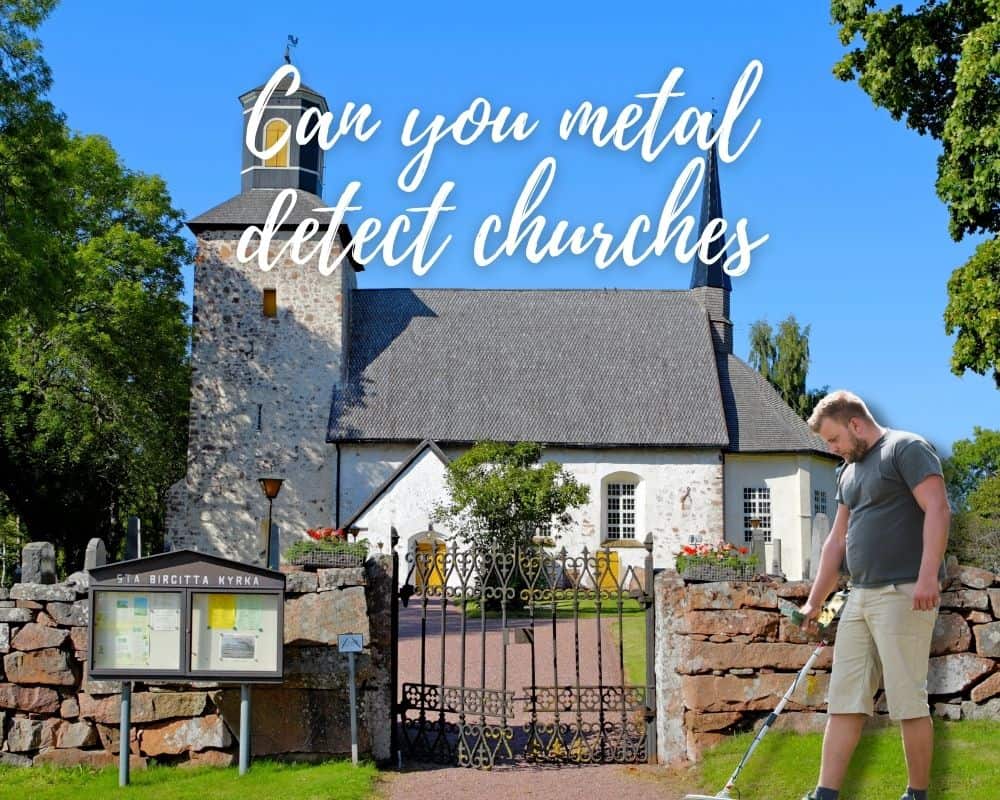
Churches are another popular metal detecting destination for many of the same reasons as cemeteries.
They’re often located in historically rich areas and can yield all sorts of interesting artifacts. In addition, metal detectors can be very useful in locating lost valuables that may have been misplaced over time.
Metal detecting a church is much less controversial than a cemetery, but getting permission may be a bit more difficult.
You see, some detectorists believe you can simply ask the pastor or father for permission, and surprisingly, most are usually willing to allow you to metal detect the church property.
While this path has been successful and continues to be, you have to be careful that the true authority in this scenario is not the church council.

The church council is the body of individuals who oversee all aspects of the church, including property and land matters.
Some metal detectorists have reported being approved by the pastor and even a member of the council, but if not all members agree, you may find yourself having to metal detect elsewhere.
Regardless of who you get permission from, you may have to offer up a small donation to the church as a way of saying thank you for letting you metal detect their property or simply share in whatever you may find.
This is not always the case, but it’s something to be prepared for.
What Can I Find Metal Detecting on Church Property?
The same sorts of things that can be found in metal detecting in a cemetery can also be found on church property.
This includes old coins, jewelry, buttons, and other metal objects. However, you may also find religious artifacts such as crosses, Bibles, and other items of religious significance. The older the church, the more relics and valuable finds you will come across.

Throughout history, churches have hosted weddings, funerals, traveling fairs, and a wide range of social events for the people in their communities. Because of this, the varying types of artifacts you can find metal detecting on church property are endless.
From old coins and jewelry to religious relics, there is potential to find all sorts of interesting things metal detecting on church grounds.
The best places to go relic hunting or coin shooting on church property are usually in the oldest parts of the churchyard. For example, the base of the largest trees or near the entrance of the church are often good places to start.
Another great tip is to metal detect around areas where people would have gathered in groups. For example, near benches or under gazebos is often a good bet.
This is where you will find the most history and, as a result, the most interesting finds.
Can You Metal Detect in National Forest?
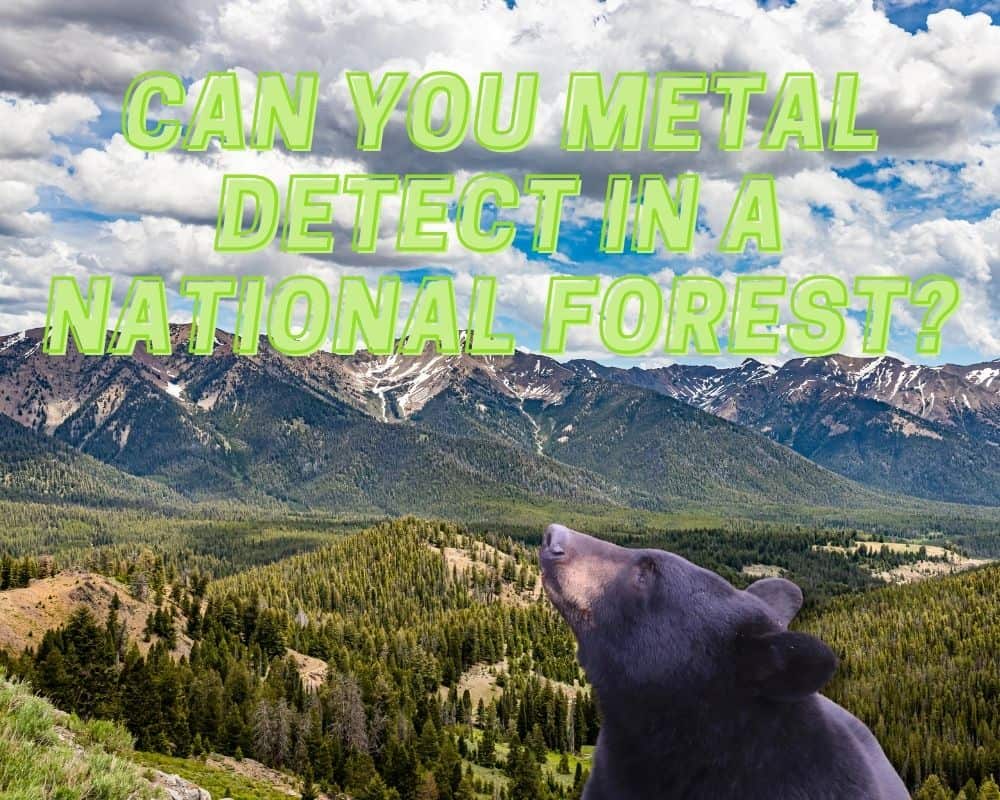
Yes, you can metal detect in national forests but there are a few things to keep in mind.
First, be sure to check in with the local ranger station to get permission or see if it’s needed.
According to the Forest Service policy, most of the national forests are open to recreational mineral and rock collecting, gold panning, and prospecting in regards to metal detecting.
In most cases, there is no need to get authorization but it’s best to check before you start a hunt.
What’s great about metal detecting in a national forest is that whatever you find is yours to keep, within reason.
The exception comes when the metal detected is considered to be of historical value or significance. At that point, they would be considered part of an archeological site and you would need to report the find.
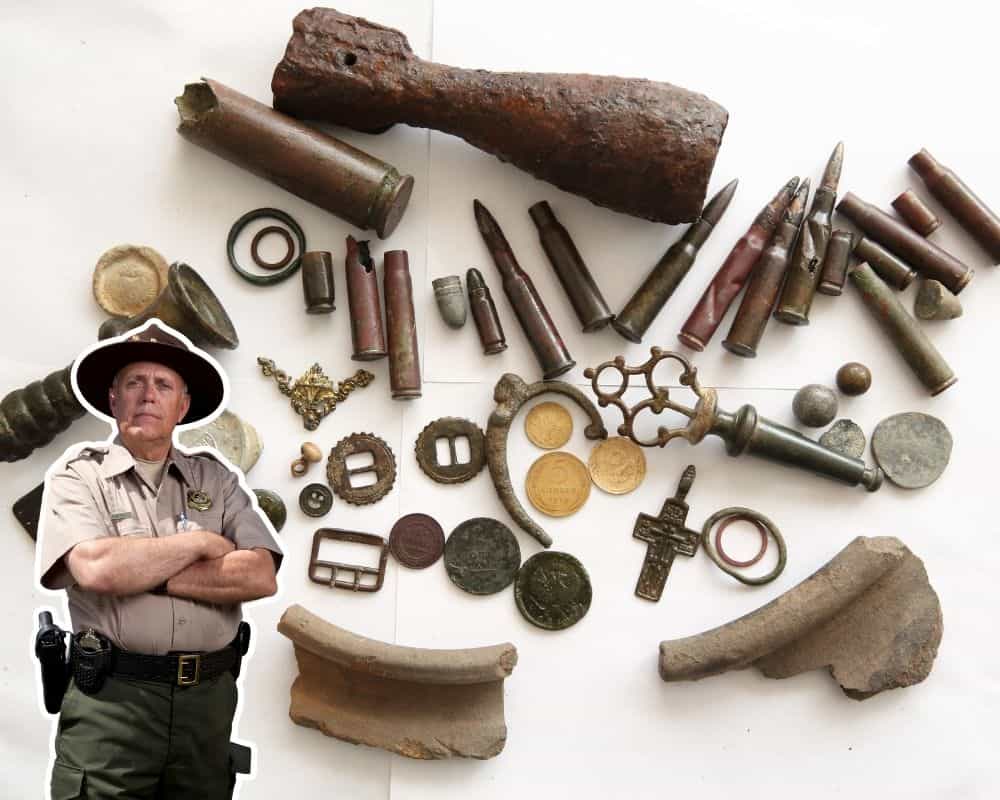
The other consideration when detecting in these areas is if you need to unearth any object that disturbs the surface area more than just some shallow digging.
This is where you may need to get a permit that authorizes metal detecting and gives you specific guidelines to follow.
What Can I Find Metal Detecting in a National Forest?
National forests are huge and, as a result, there is potential to find all sorts of things metal detecting.
The best places to start are often near old homesteads, campsites, or cabins. If you can find an area that was once inhabited, you’re likely to come across some interesting finds.
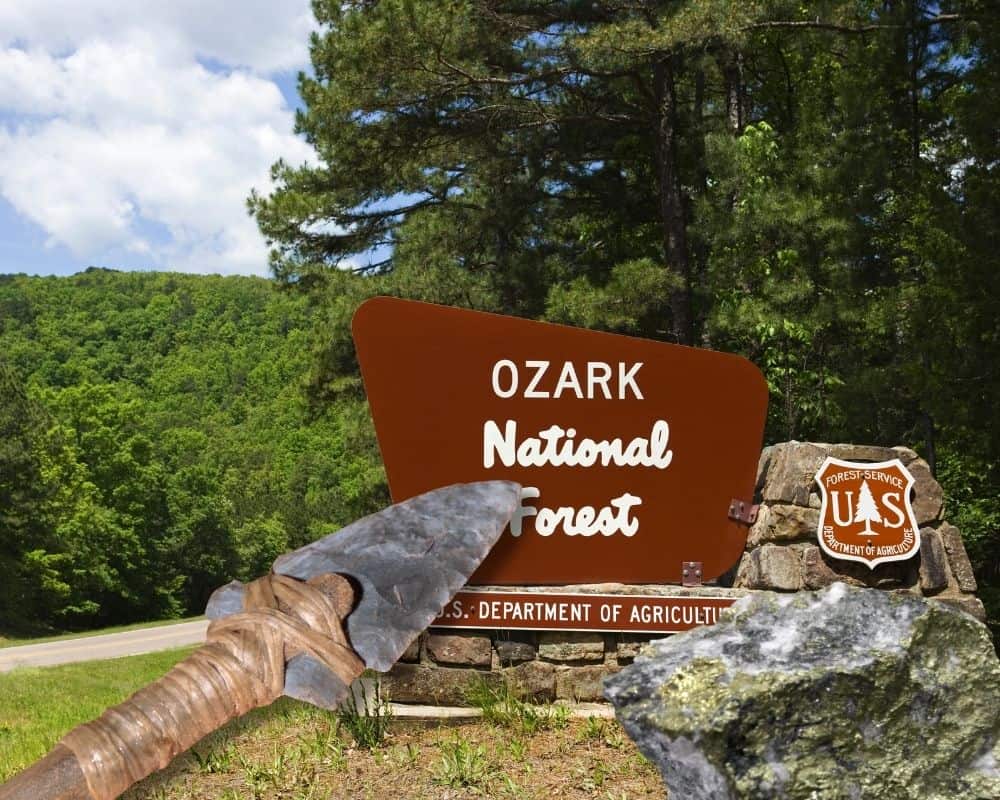
You may find old coins, metal objects, jewelry, valuable minerals, or even some fossils.
Another great place to metal detect in a national forest is near water. Beaches, creeks, and rivers are all great places to look for lost metal objects.
Can You Metal Detect on State Land?
The answer to this question is a little more complicated because it can vary from state to state.
In general, you will need to get permission before metal detecting on state land. This is because most states consider metal detecting to be a form of surface disturbance, specifically prohibiting disturbing vegetation and rock removal.
As a result, you will likely need to obtain a permit before metal detecting on state land.
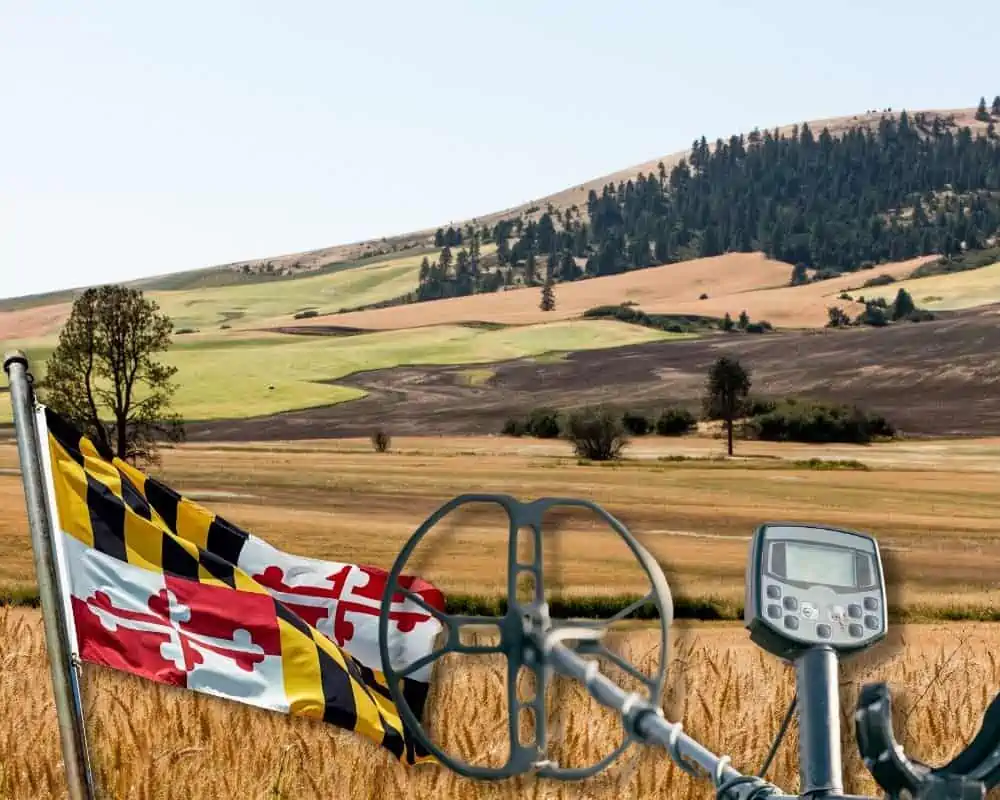
State land is often considered to be any land that is not privately owned or part of a city or town. This can include state parks, forests, wildlife areas, and even some beaches.
If any of these properties do not display the direct allowance or disallowance of metal detecting, then you are better off seeking out permission. Otherwise, you could be at risk of being ticketed or fined.
Some states are more accepting than others. You’ll find scenarios where a state will open up beaches for metal detector use but prohibit it in other areas, like parks. You can be sure that any area that is deemed historically significant or culturally important will not allow metal detecting.
What Can I Find Metal Detecting on State Land?
The possibilities are endless but, as with any metal detecting, you’re more likely to find something if you do your research ahead of time.
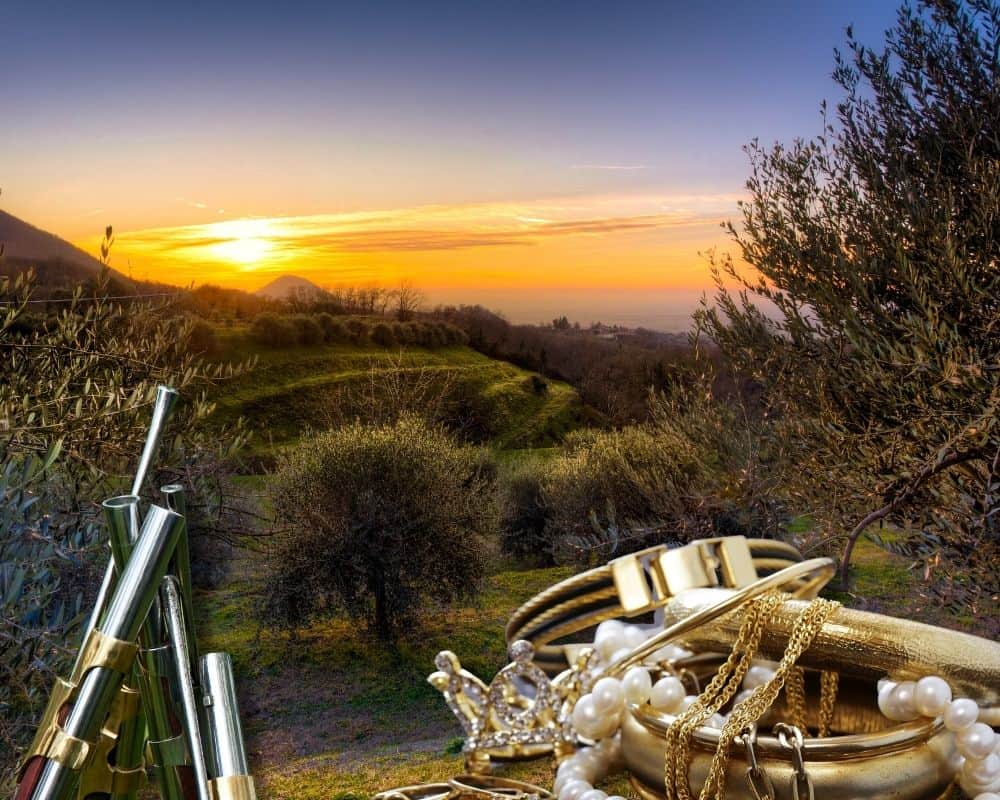
State parks and forests often have a wide variety of things to offer metal detectorists.
While you’ll come across your usual coins and jewelry, depending on the area, there’s always a good chance of discovering some exciting relics. This is true throughout the United States where our country has experienced events like the revolutionary war, the civil war, and the westward expansion.
Metal detecting can be a great way to connect with the past while also having the opportunity to find some amazing treasures.
Can You Metal Detect in City Parks?
This is another complicated question.
However, yes, you can metal detect in city parks…most of the time.
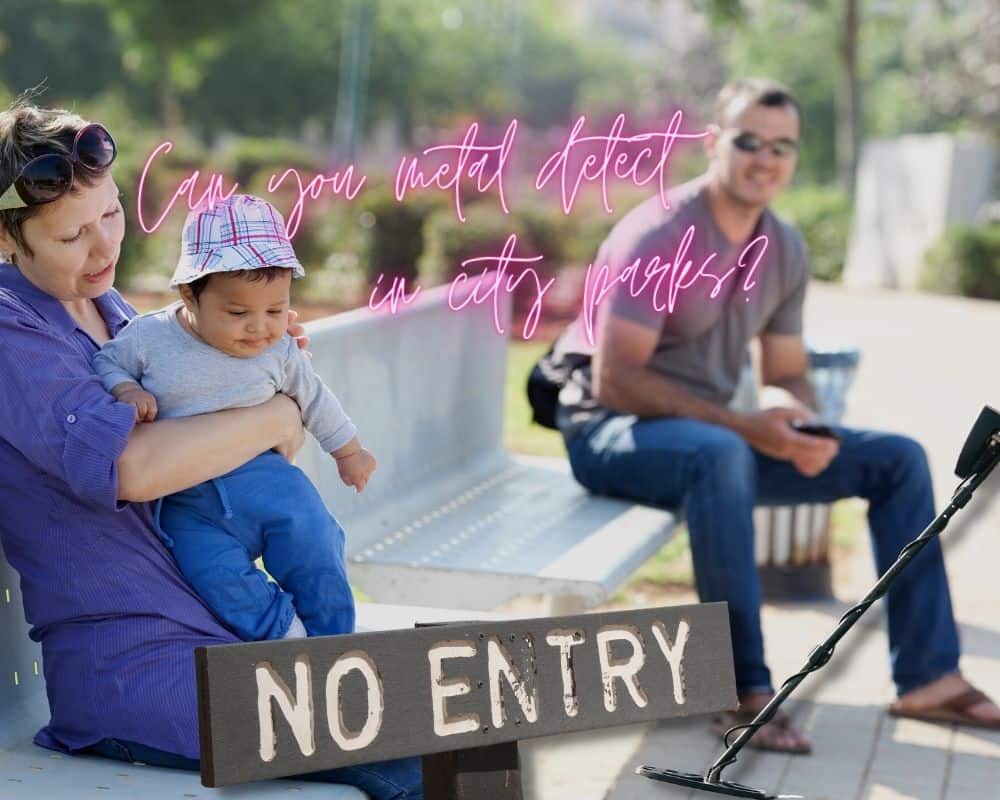
The bottom line is that you need to check with the city or town before metal detecting in any public parks.
While some may allow it, others will not and you don’t want to risk getting caught and having your metal detector confiscated.
If we’re talking about your neighborhood park, then the answer is most likely yes.
These types of parks are usually small and don’t have a lot of people in them, so you’re not likely to cause any disturbance and the city doesn’t usually put up a fight about these areas.
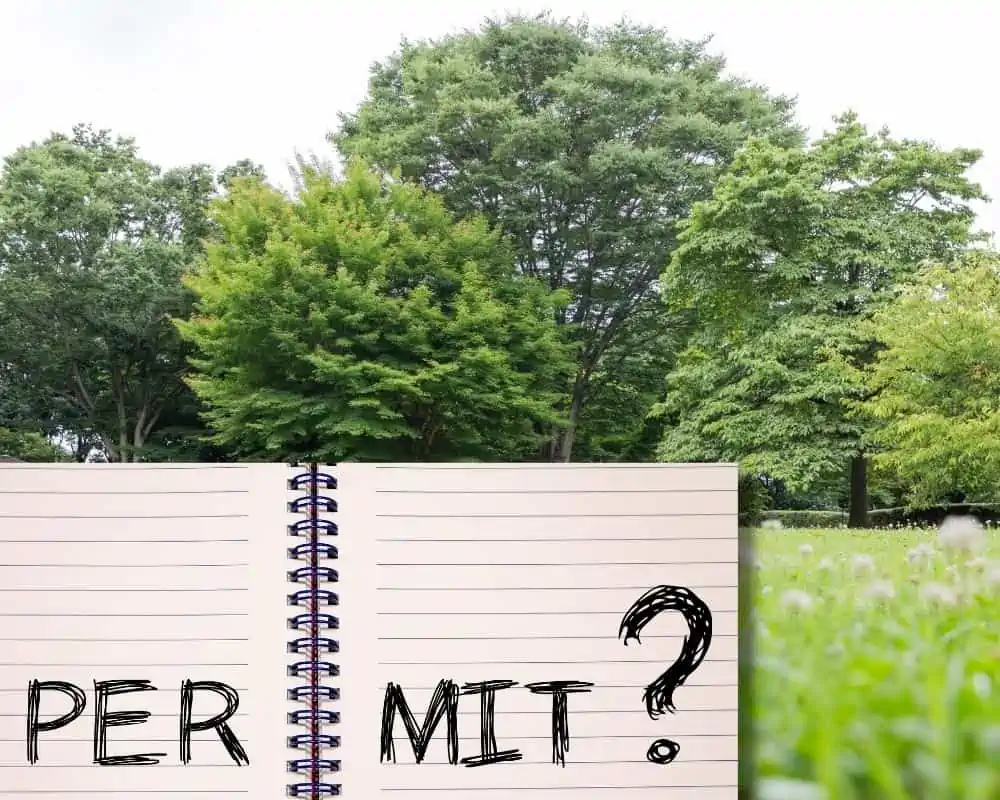
However, if we’re talking about larger, more popular parks, you will usually find that metal detecting isn’t allowed, or a permit is needed before you start hunting. If a permit is needed, it’s fairly easy to obtain one and usually only requires filling out a short application with the parks and recreation office.
Larger parks are often metal detecting hotspots because they receive a lot of foot traffic and there’s always the potential of finding something valuable that was lost.
What Can I Find Metal Detecting in City Parks?
You’ll find all the usual suspects like coins, jewelry, and your random bits of trash. But because city parks are often old and have a lot of history, you also have a good chance of finding some interesting relics.
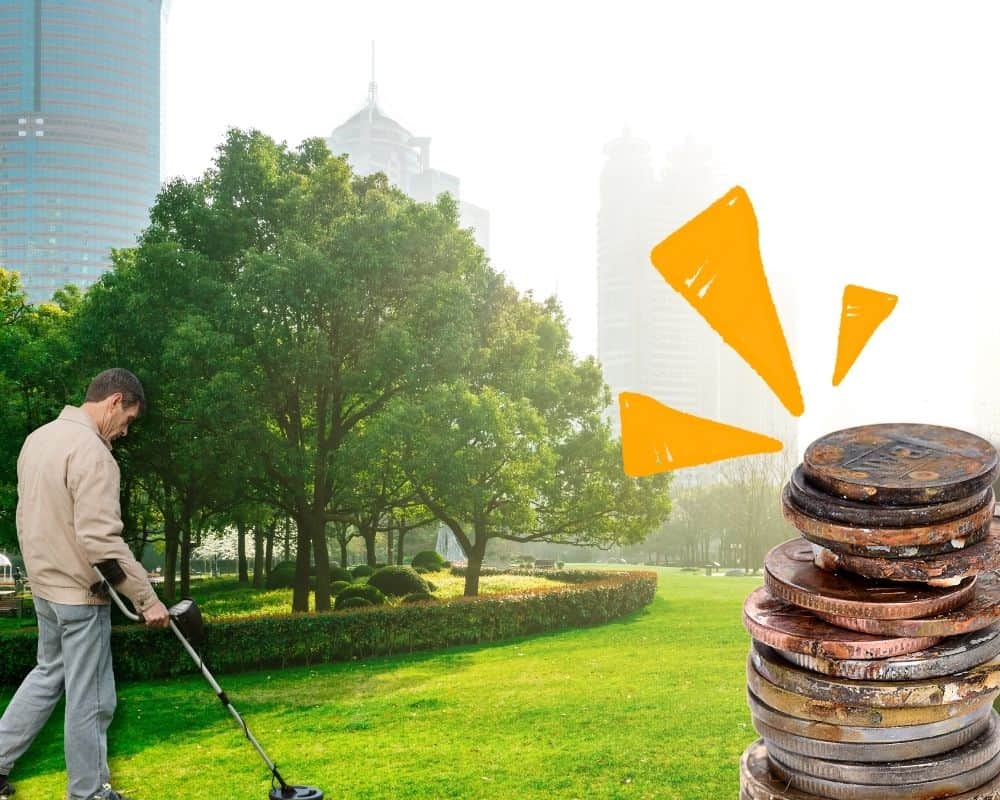
This is especially true if the park was once used as a military camp or battleground.
Another benefit to hunting in city parks is that many of them host events that draw people in by the hundreds and thousands. This creates an opportunity to discover things that were lost in the crowd.
What you should keep in mind when collecting all these little treasures is that you’re generally free to keep anything you find, even lost money.
However, if you find something that is older than 50 to 100 years, it’s best to contact the parks and recreation office so their city archeology department can determine if it has any historical significance. In which case, you may not get back the treasure you found.
Do You Need a License to Metal Detect in the UK?
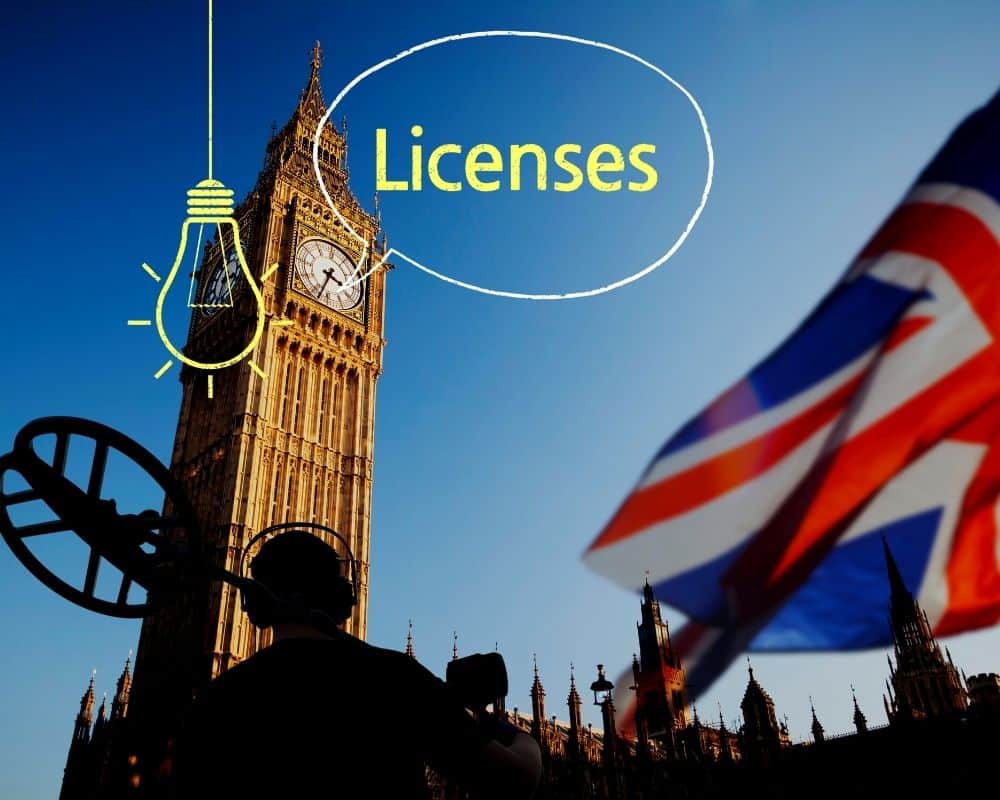
The United Kingdom has a long and varied history, which makes it an ideal place for metal detecting.
However, before you start your treasure hunting adventure, you need to make sure you’re familiar with the laws and know the rules governing proper metal detecting policies.
When it comes to the UK archeological society and the local metal detecting community, it wasn’t always easy to get along. With the Stop Taking Our Past initiative in the 1980s, metal detecting was at risk of being permanently banned.
However, they’ve slowly been working together to help preserve the history of the UK while also allowing metal detectorists to enjoy their hobby.
Now back to the question at hand…
In the UK, metal detecting does not require a license. Actually, for those interested in metal detecting on the UK shores, all you need is a permit from the Crown Estate since as of 1980, licenses were no longer required. The Crown Estate is the organization that manages all the land owned by the British monarchy.

Except for a few private holdings, the monarch owns the majority of the UK’s beach property.
Metal detecting in the UK is similar to that in the United States. It is illegal to metal detect without a permit if the land is privately owned, of significant archaeological importance, surrounding a nearby monument, or a site of special scientific interest.
For a better understanding of what policies are used and what is expected of metal detectorists in the UK, you can find more detail from the National Council For Metal Detecting (NCMD) code of conduct.
What Can I Find Metal Detecting in the UK?
Since it is such an old country with so much history, you can find all sorts of interesting artifacts in the UK.
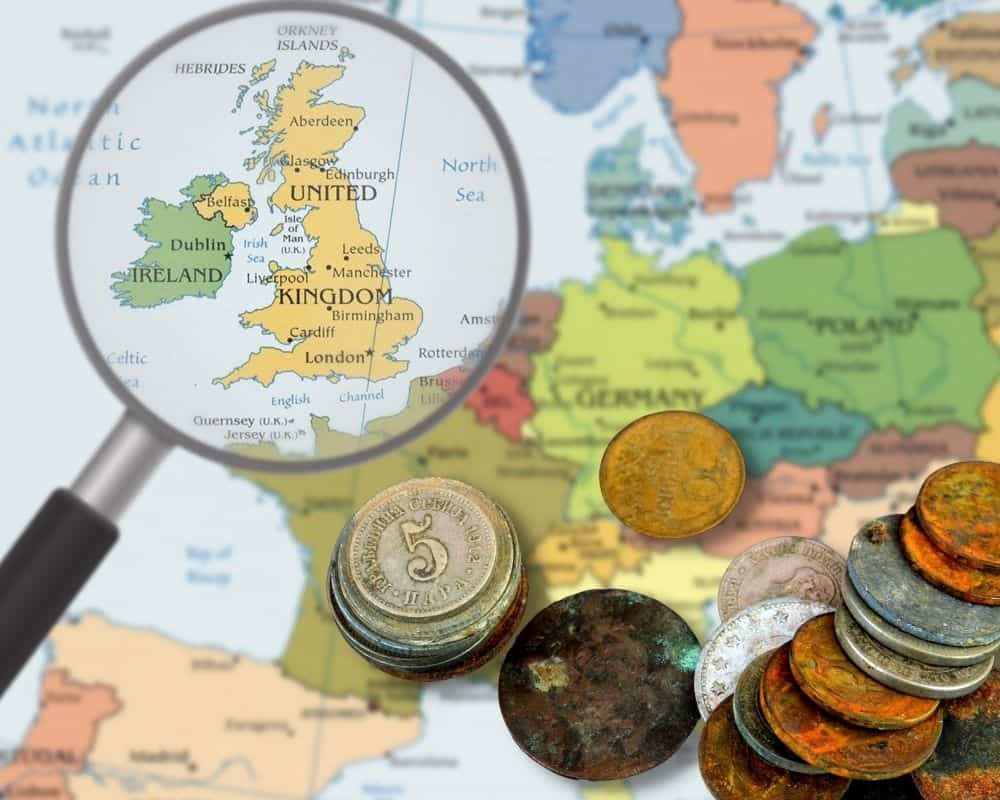
Some of the more common things you’ll come across are coins, jewelry, and various metals. But if you’re lucky, you might also find some ancient artifacts or even lost treasures like gold, silver, ancient weaponry, and more.
The possibilities are endless, which is part of what makes metal detecting in the UK so exciting.
Just keep in mind that any archaeological finds must be reported to the local Finds Liaison Officer (FLO) as soon as possible. You are also required by law to report any historical objects or treasures you find that are over 300 years old according to the 1996 Treasure Act.
Can You Metal Detect in Creeks?
Yes, you can metal detect in creeks. But, it’s your responsibility to check for any local regulations or ordinances that may be in place before you start.
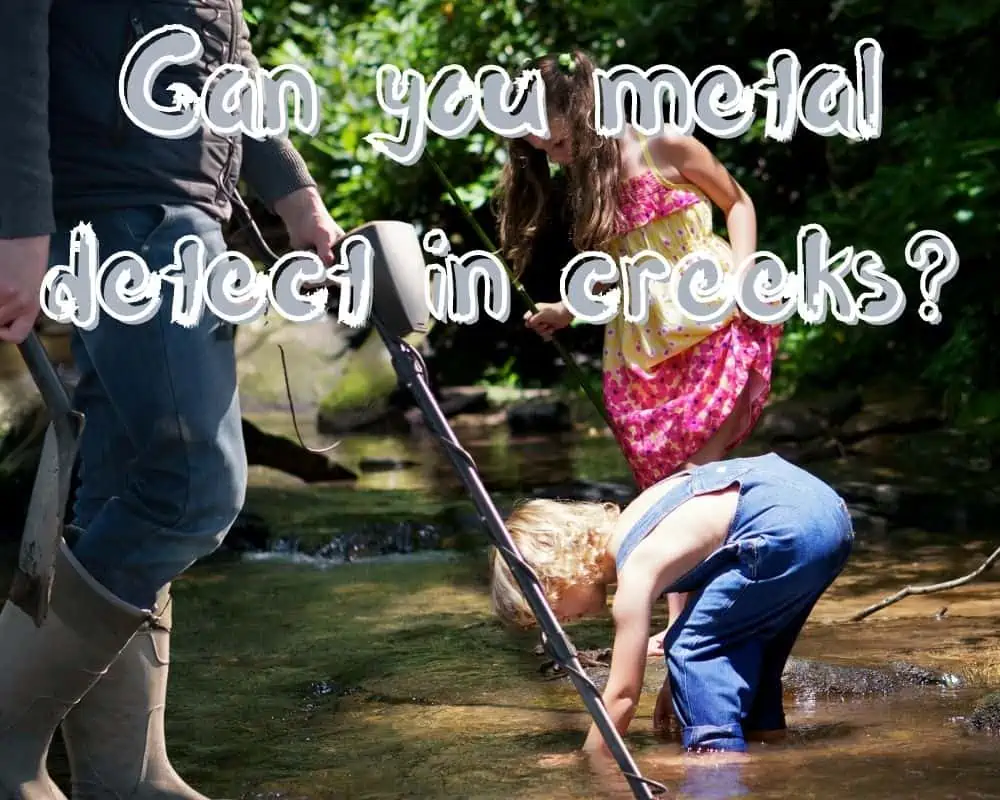
Some creeks are part of a state or national park, which means metal detecting is allowed but there may be special regulations in place. For example, some parks only allow metal detectors with a special permit.
Other creeks may flow through privately owned land. In this case, you would need to get permission from the landowner before metal detecting. However, there are exceptions to this rule.
For some states, waterways that run through private land are considered public property as long as the water is navigable, which means you wouldn’t need permission to metal detect.
You can check the state regulations and property laws you are in for more defined metal detecting guidelines.
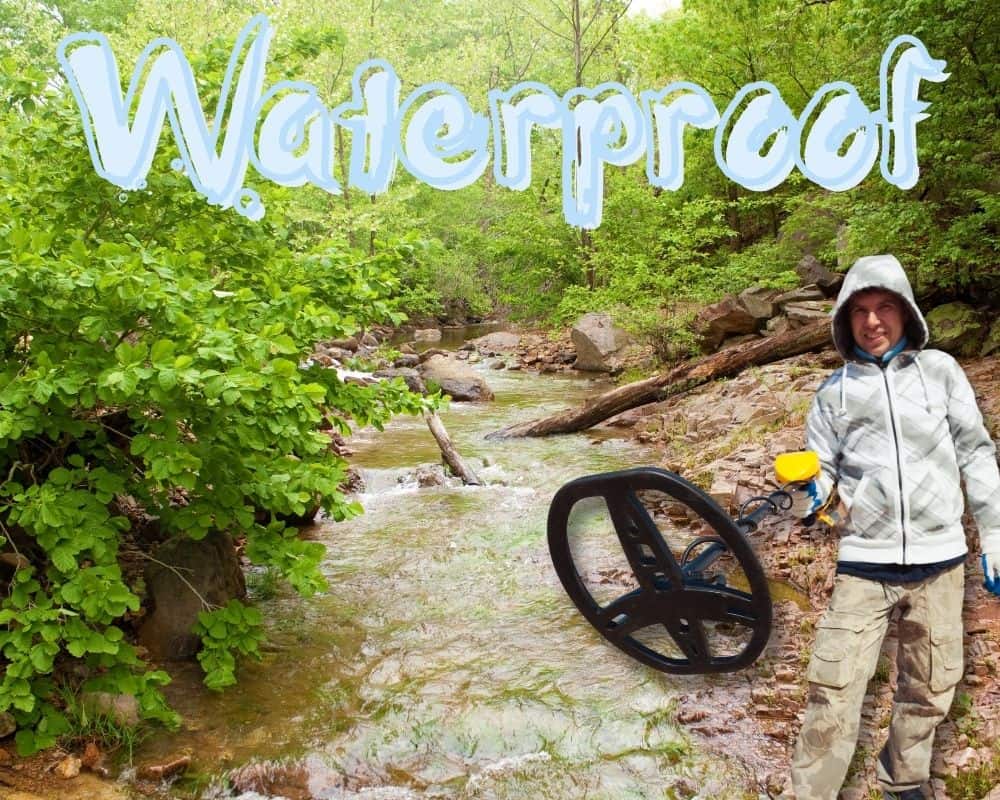
The best way to metal detect in a creek is to use a waterproof metal detector. This will help you avoid getting your equipment wet and damaged. For some ideal options, be sure to check out our article on the best metal detectors for water.
You should also wear clothing that can get wet and be prepared to get muddy.
What Can I Find Metal Detecting in a Creek?
Creeks are a great place to metal detect because they are full of all sorts of interesting objects.
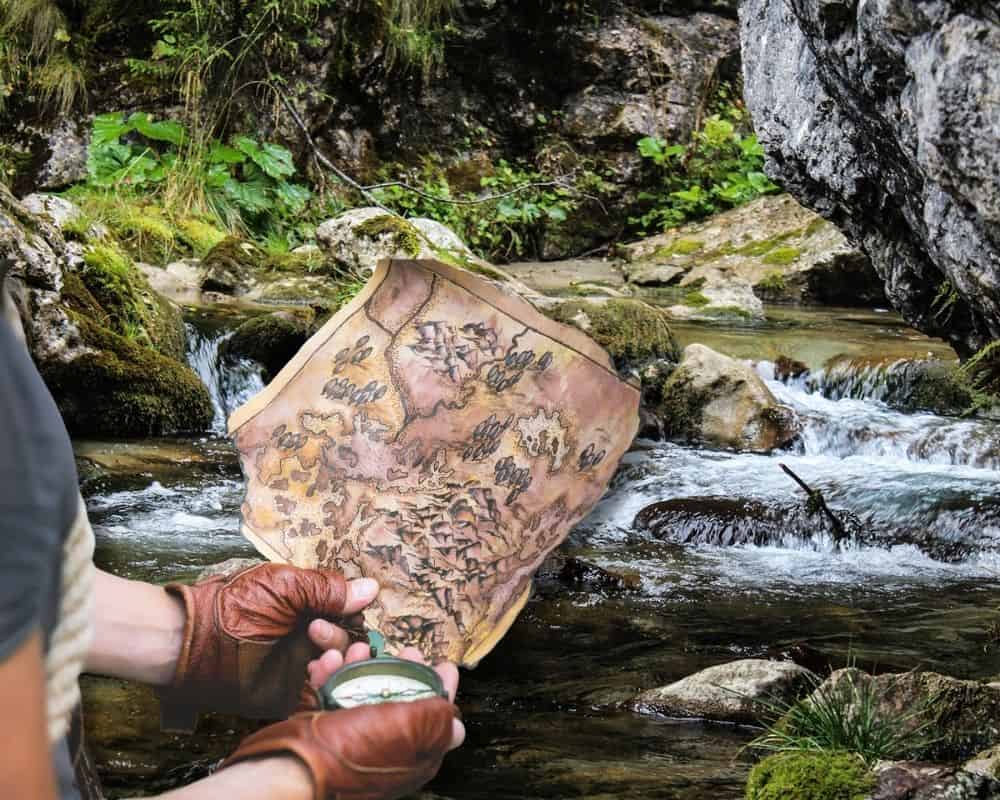
You’ll find all the usual treasures for sure (coins, buttons, etc.). In addition, expect to find some not-so-common goodies like lost phones, small knives, musket balls, and other cool metal objects. You might also come across some non-metal items like arrowheads, pottery shards, and more.
Of course, what you’ll find will depend on the location of the creek and how long it has been since it was last dredged or cleaned out.
Creeks are one of my favorite places to metal detect because you never know what you’re going to find, but you can be sure you’re coming home with something new.
Do You Need a Metal Detector Permit in Colorado?
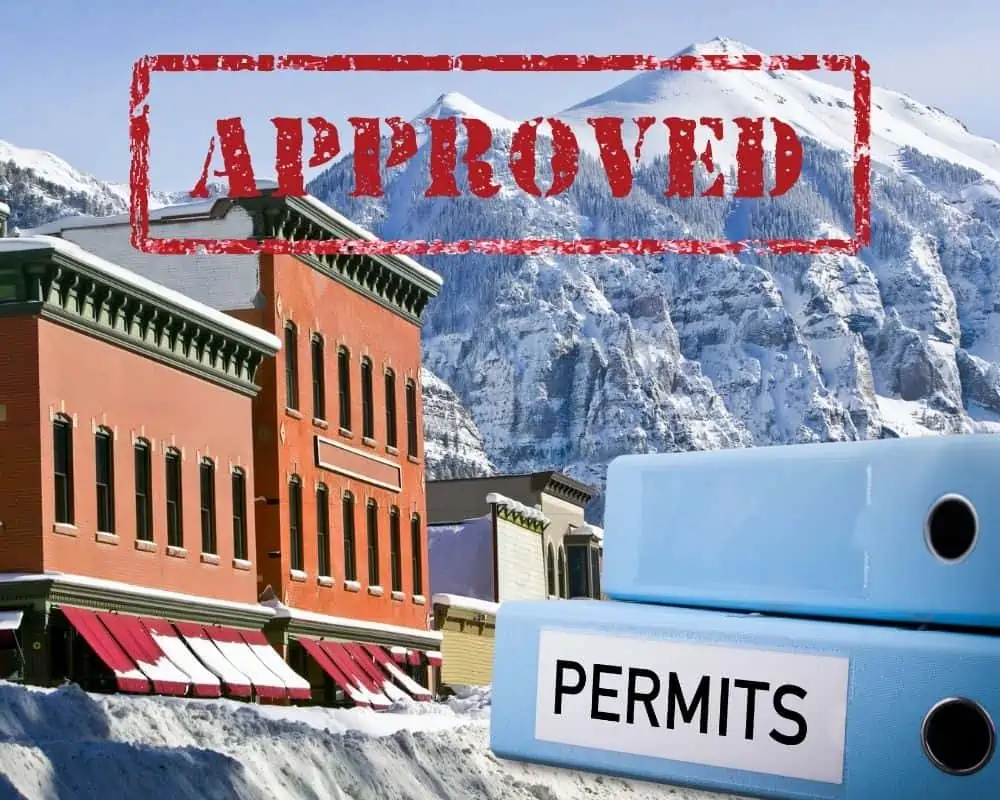
Yes, you do need a permit to metal detect in Colorado. While some detectorists might say if there’s no sign prohibiting it, then you’re good to go, it’s not always the case.
Getting a permit is not a difficult process and is certainly worth it, especially in Colorado.
This state has some of the best metal detecting opportunities in the country. There are many old mining towns, abandoned homesteads, and other great places to explore.
But, it’s not without its drawbacks.
Because of the federal law ARPA, you cannot remove any items on public land that is over 100 years old, making your adventure a little limited. However, if you find anything older than 100 years on private property, it is yours to keep! As long as you’ve been given permission by the property owner first.

Another downside is that even if you obtain a permit to metal detect on public land, it will not apply to their 41 state parks. Your best bet here is to get permission from the park manager.
Despite this, if you’ve got permission or a permit and you’re all set to go prospecting for gold, stop by our list of best metal detectors for finding gold!
What Can I Find Metal Detecting in Colorado?

Colorado is a great place for metal detecting because of its long and rich history.
You can find all sorts of interesting items, from old coins and buttons to more unique finds like knives, bullet casings, and even gold nuggets, all dating back to the Colorado gold rush!
Of course, what you’ll find will depend on where you’re metal detecting. For example, old mining towns will offer different finds than abandoned homesteads.
But, no matter where you metal detect in Colorado, you’re sure to find something interesting.
FAQ’s About Metal Detecting in Cemeteries
Before you get going, below are some really fascinating questions that come up a lot in regards to metal detecting in cemeteries. Be sure to check them out!
Can You Find a Grave With a Metal Detector?
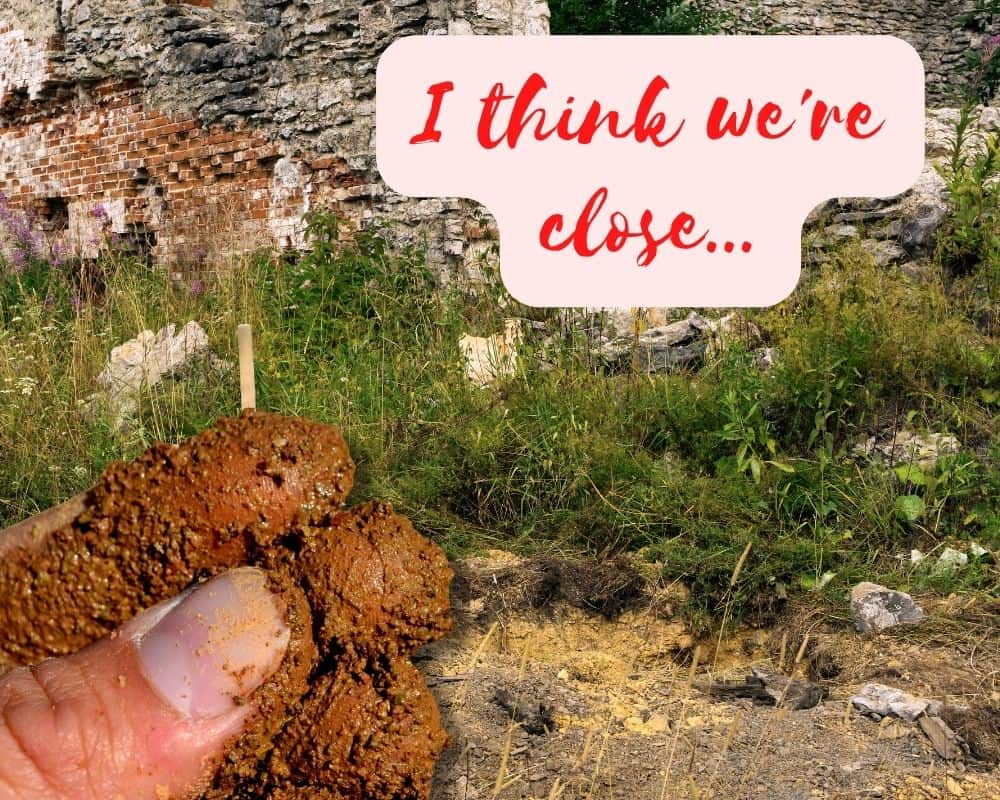
This is a pretty common question and the answer may surprise you. In short, metal detectors can be used to find graves, but they’re not always 100% accurate. This is because metal detectors work by picking up metal objects that are buried underground.
While most cemeteries do have metal grave markers, not all of them do. So, if you’re using a metal detector in a cemetery that doesn’t have metal grave markers, it’s possible that you won’t be able to find any graves.
However, depending on the age of the grave area, you are sure to come across metal objects such as nails, buttons, coins, and more significantly, lead coffins. Sometimes, you may even be able to pick up on some metal furnishings that were either buried with the deceased or fashioned to the outside of the coffin.
What is the Best Metal Detector for Cemeteries?
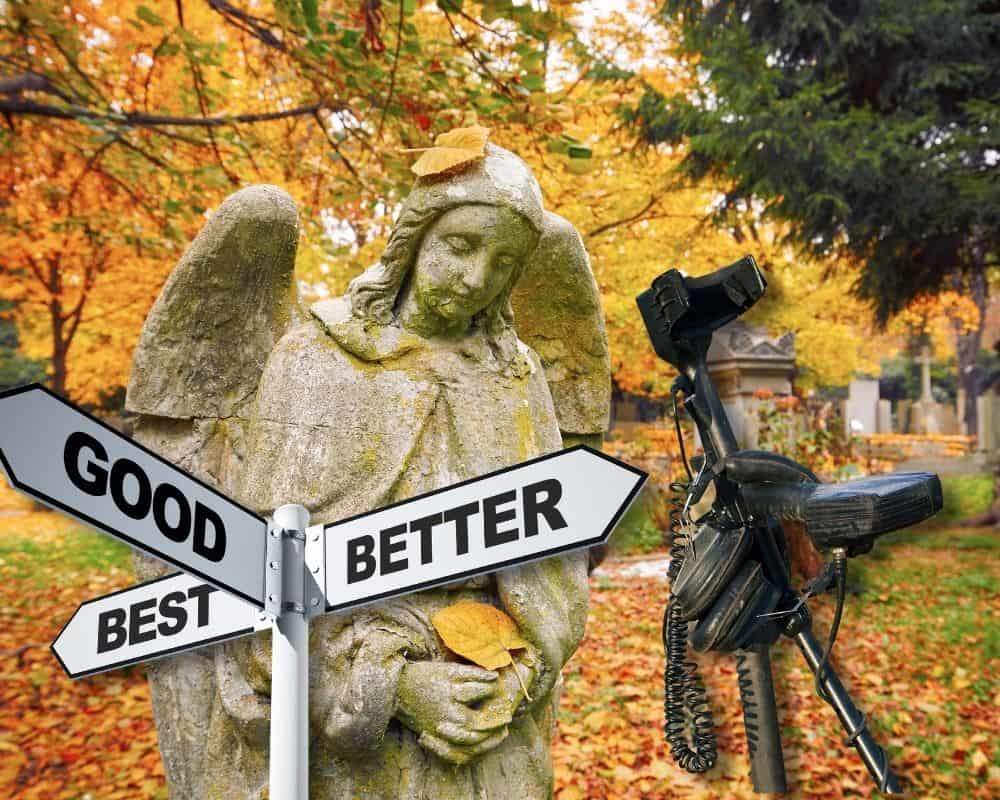
This is a difficult question to answer because it really depends on what you’re hoping to find. For example, if you’re interested in finding metal grave markers, you’ll need a metal detector that is specifically designed to find metal objects that are buried deep underground.
While some older caskets may be buried a bit deeper, on average, more modern graves only go as deep as 4 feet.
If you’re interested in locating objects in a cemetery with deeper ranges, be sure to take a look at our best metal detector review for treasure hunting.
If however, you are just looking for some shallower metal objects, such as coins or jewelry, any metal detector will do. In fact, we highly recommend checking out the Garrett ACE 300 for its combination of versatility, performance, and price.
Why Would You Want to Find a Grave With a Metal Detector?

Believe it or not, there are some good reasons you’d want to locate a grave, and a metal detector is a perfect tool to help you.
For example, metal detectors can be used to find unmarked graves. In cases where the deceased was buried without a headstone or other marker, it can be difficult to locate their final resting place.
A metal detector can also help you find old graves that have been lost over time. This is especially useful if you’re doing genealogical research and are trying to locate a particular ancestor.
Metal detectors can also be used to find graves that have been disturbed by animals or erosion. If you suspect that a grave has been tampered with, a metal detector can help you determine if there are any metal objects present that shouldn’t be there.
Should You Metal Detect in Cemeteries?

Now that we’ve cleared up the question over being allowed to metal detect in a cemetery, let’s talk about the next important question.
Should you?
As with anything, metal detecting in a cemetery comes with its own set of pros and cons, as well as its fair share of ethical debates and personal dilemmas.
On the plus side, metal detecting in cemeteries can be a great way to find lost treasures. If you’re lucky, you may even come across some rare or valuable items.
Cemeteries can also be a great place to metal detect if you’re interested in doing some historical research. By metal detecting in cemeteries, you can learn a lot about the people who lived in the area, as well as get a better understanding of the local history.
On the downside, metal detecting in cemeteries can be very emotionally taxing. After all, you are essentially digging through people’s final resting places.

It’s also important to acknowledge the image it presents to the metal detecting community. While many detectorists are fine with detecting in a cemetery (while being respectful), not everyone will feel the same way.
So, should you metal detect in cemeteries?
The answer is ultimately up to you. Weigh the pros and cons carefully and make sure you are prepared for both the physical and emotional challenges that come with metal detecting in cemeteries.

If you do decide to move forward with it, take our advice and be respectful in the process of your search, as well as the way you handle any artifacts you may find.
In my opinion, it’s good karma to try and return any lost items to the family if it’s possible. If it isn’t and you truly tried, I think you’re in the clear as far as karma is concerned.
What Is the Archaeological Resources Protection Act (ARPA)?
The Archaeological Resources Protection Act (ARPA) is a federal law that protects archaeological sites on public lands from being disturbed or destroyed.

The law applies to all archaeological resources that are at least 100 years old, including human remains, burial goods, and pottery.
If you metal detect in a place that is covered by the ARPA, you could be subject to fines or even jail time.
So, if you’re metal detecting on public land, it’s important to research the area beforehand and make sure that you are not disturbing any protected archaeological sites.
While the ARPA may seem like a pain, it’s actually a good thing. The law helps to preserve our country’s history and allows future generations to learn from the past.
Wrapping Up
Metal detecting in cemeteries can be a great way to find lost treasures, learn about the local history, and do some genealogical research. However, it’s important to be respectful of those who have passed and aware of any protected archaeological sites in the area.
The same protections that exist for cemeteries also exist for churches, national forests, state land, and city parks. So, before you start metal detecting in any of these places, make sure to do your research and get permission if necessary.
Until next time!



